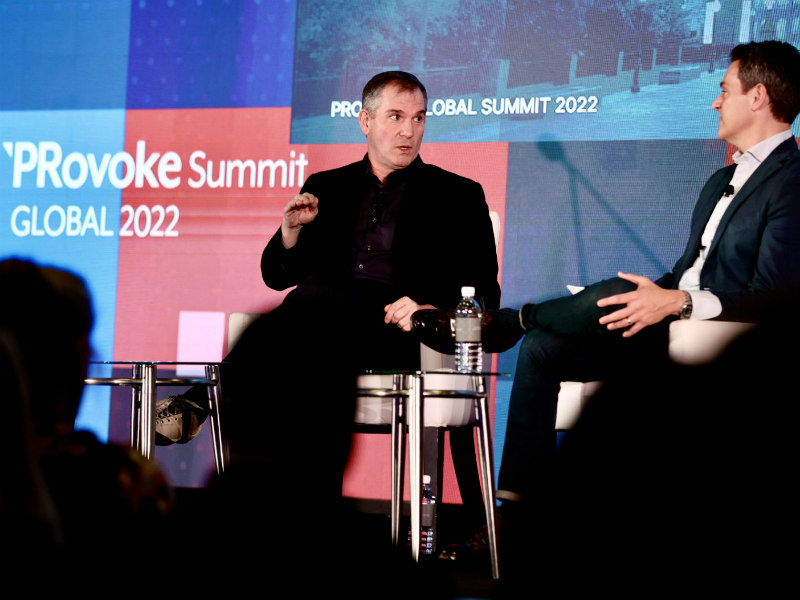Paul Holmes 26 Oct 2022 // 3:05PM GMT

WASHINGTON, DC — More and more companies will find themselves in the political crosshairs as politicians look to pick fights that appeal to the sympathies of their supporters, best-selling author, Duke University professor and longtime New York Times opinion journalist Frank Bruni told PRovokeGlobal this morning.
In conversation with Brian Ellner, EVP, growth & marketing at BCW and US public affairs lead for WPP, Bruni was responding to a question about the conflict between Florida Governor Ron DeSantis and Disney, which took a strong stand against policies that sought to marginalize LGBTQ+ people. “He [DeSantis] got so much applause from his base, so much national attention for fighting with Disney, any or all of the people thinking about challenging him for the Republican nomination are looking for their own fights to pick. They look at what he did with Disney as something to be emulated.”
The discussion, which focused on the pressures on companies to take a stand — and the backlash when they do — had started with another timely example: anti-Semitic remarks by rapper, record producer, and fashion designer Ye (formerly Kanye West) and the reaction of companies that have worked with him — particularly adidas, which terminated its relationship with Ye the day before.
“The way it is being received is that they were very late to come to that decision,” said Bruni. “You never get credit if you wait until what people think is the last minute. But the larger long-term lesson is if you are going to partner with celebrities you need to think long-term versus short-term. You have to understand that you are hiring everything they have done in the past and everything they might do in the future. I think corporations will be more cognizant of the risks as a result of this.”
But Bruno put the Ye incident in historical context, suggesting: “We are bad in general as people and bad in the media at seeing things in a historical context.” He pointed to an incident involving Whoopi Goldberg almost 20 years ago, when she was a spokesperson for Slim Fast and made controversial remarks about then-president George Bush.
Even so, Bruni acknowledged that political pressure would become the “new normal” as companies face countervailing pressures.
“One thing is the changing relationship between employees and employers. Employees — and younger employees in particular — have different expectations that make it difficult for companies to take a pass. At the same time, you have a different situation with the Republican Party, which had always been the party of free markets and big business, increasingly vilifying companies that they see as putting their foot on the political scale.
“I think Republicans would argue that these are not decisions that look exclusively at bottom line; they are about steering the world in a direction that conforms to your ideology or values.”
Ellner talked about the new pressure on companies that have adopted environmental, social and governance policies, particularly financial companies that appear to be using ESG as a critical factor in their investment decisions.
“If Republicans win the House in the midterms, there will be hearings that seek to publish companies that are seen as having done things in the name of a woke ideology,” said Bruni. “Donald Trump had used Twitter to rage at companies that weren’t doing things he wanted them to do, down to Macy’s no longer carrying his products. Every company needs to understand and deal with that, and do what they will with it. But they can’t be caught unaware.”
He also talked about the role of social media, and the changing ways in which people consume news and information.
“The initial promise of the internet and social media was that they were going to bring us together and connect us, and there are positive social movements that owe their success to social media. But social media have given people the ability to curate their own reality. When I grew up there were four networks and there were morning newspapers, and those broadcasts felt they had to offer a little bit of something for everyone.
“There were problems with that model. The people who controlled them were a very narrow group and not very diverse. But we were all having conversations from the same starting point. Today, people can believe they are informed because they have bookmarked 10 sites and follow 40 accounts. But a lot of people are consuming the same thing over and over again. You feel you are well fed, but you’re not. You with all your broccoli can’t talk to her with all her red meat because you’re not only not eating the same food, you’re not even sitting at the same table.”
He was at pains to emphasize that he was not recommending companies withdraw from political discussion or ignore the demands of their employees. “There are degrees of passion you can bring to these issues, and there are ways of getting involved while drawing more or less attention. There’s no one answer.
“The important thing is that companies need to recognize this tension, understand the range of responses, and the kind of issues that can come down the pike and that they have thought it through. You can look at the companies that have turned this to advantage, like Dick’s Sporting Goods, which after a school shooting decided that they would stop selling guns. Their stock went up, there was no bottom line impact.
“What made that work was that it was a reflection of leadership’s principles and a genuine moral reaction to school shootings. There’s nothing that says you should not take moral stands. But you have to be prepared to face the consequences.”


































.jpg)





.tmb-135x100.jpg)











